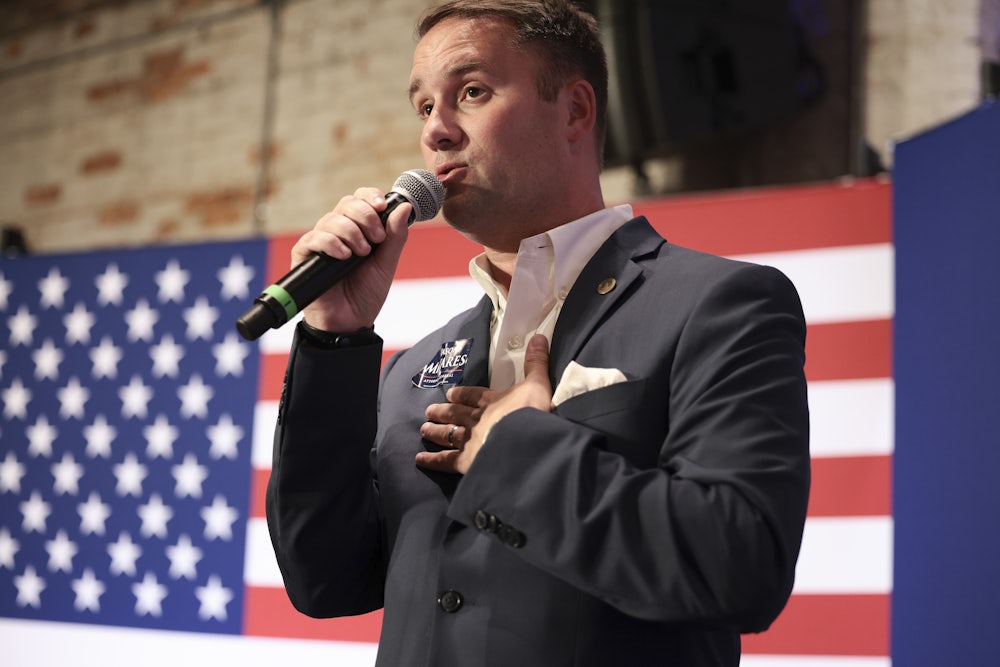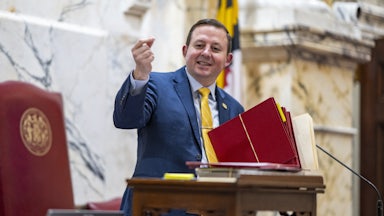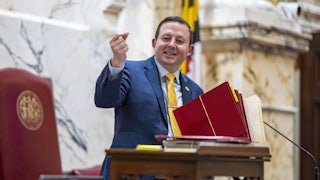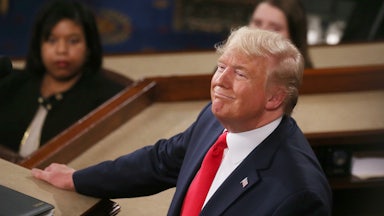A Republican candidate for attorney general in Virginia has been trying to downplay the support he’s received from donors and entities that helped incite the January 6 mob attack—a possible sign of the flavor of the next class of conservative attorneys general to come into office.
The lion’s share of donations received by the nominee, Jason Miyares, came from the same Republican organization that helped gin up supporters to storm the Capitol on January 6 through robocalls.
The most recent campaign finance report for Miyares, a member of the Virginia House of Delegates, shows he has taken more than $2.6 million from the Republican Attorneys General Association. The group is Miyares’s largest donor by far. After RAGA, Miyares’s next-largest donor is the Republican Party of Virginia.
Usually, a candidate receiving support from a party committee charged with supporting that candidate is as anodyne as it gets in politics. There’s a National Republican Senatorial Committee that is basically the high command for Republican candidates for U.S. Senate. There’s a Democratic Congressional Campaign Committee that is the chief organization for Democratic congressional candidates. There are even similar groups for more obscure or technical posts like secretary of state.
But what makes RAGA different right now is that a nonprofit arm of the group, the Rule of Law Defense Fund, sent out robocalls encouraging supporters to travel to Washington, D.C., for the January 6 Stop the Steal rally that morphed into a violent mob storming the Capitol. The robocalls told supporters to “fight” Congress in support of Donald Trump’s false claims of voter fraud.
It’s common for a campaign committee to weigh in on the topics du jour, even when those topics don’t directly connect with the committee’s main mission. It’s even normal for a campaign committee to stretch out of its comfort zone a bit to support its party’s incumbent president or its presidential candidate. But it’s very unusual for a campaign committee—especially one whose mission is to elect officials into law-and-order roles—to push supporters near the line of unlawfulness, as RAGA’s Rule of Law Defense Fund has done.
The fallout within RAGA and among its community of attorneys general and attorney general candidates has been significant. A former chair of the RLDF, Alabama Attorney General Steve Marshall, denied any awareness of the robocalls. Another chair of RAGA and the group’s executive director have left the organization as a result of the attention on the role RAGA played in firing up Trump’s supporters. The new executive director, Peter Bisbee, previously ran the RLDF and approved the robocall expenditure.
And the spotlight has fallen on RAGA’s donors, including Julie Jenkins Fancelli, the wealthy heiress to the Publix grocery store chain, whose $150,000 donation to the RLDF was intended to help fund the rally, according to The Washington Post.
On the campaign trail, Miyares’s Democratic opponent, Attorney General Mark Herring, has been running ads attacking the Republican on the donations. “Organizers who planned and financed January 6 are now financing Jason Miyares with half-a-million dollars,” the narrator said in one such ad. “And Jason Miyares is in lockstep with their agenda.”
Miyares has not directly addressed the donations. He has said that he does not think the election was stolen from Trump and that there was no widespread election fraud in Virginia. But Miyares has not responded to pressure to address the donations from RLDF.* He has also declined to respond to press inquiries about the donations. His television ads generally don’t mention his party affiliation. He’s tried to describe himself as an anti-politician type.
“If you want someone trained as a prosecutor who has a victim-first mindset, I’m your candidate,” Miyares has said, in contrasting himself with Herring. He added, “I would say I’m pro-life with exceptions, including rape, incest, and threat to the mother’s life.”
Attorney general races have become far more contentious in recent years. There was a point when the two sides had a rule not to challenge incumbents of the opposing party across the country. But that detente dissipated years ago. In Virginia, Republicans are eager to knock off any statewide Democratic official, especially a two-term Democratic attorney general like Herring. But polling has shown the incumbent attorney general with the advantage by a healthy single-digit lead.
And in recent years, attorneys general have taken a prominent public role in fighting an opposing party’s policy agenda when that party controls the White House. Republican attorneys general have also proven to be a major thorn in Joe Biden’s side since, basically, the beginning of his administration. They’ve bashed him on vaccine mandates for federal contractors and filed lawsuits against the Biden administration on topics ranging from immigration to the Keystone XL pipeline.
And GOP attorneys general played a major role in the larger Republican effort to overturn the 2020 election. Many of them sought to get the Supreme Court to toss out the election results in Wisconsin, Pennsylvania, Michigan, and Georgia. The attorney general’s office for Virginia has a wide range of responsibilities as, essentially, the state’s “law firm.” It advises and represents state agencies and, when it comes to elections, investigates illegal activities and fraud.
Miyares seems to want to become that specific type of attorney general. He has participated in multiple events with Virginia state Senator Amanda Chase, who sought the party’s gubernatorial nomination and who has argued that martial law should have been declared to overturn the 2020 election results.
Miyares’s actions with respect to RAGA have implications far beyond the Virginia attorney general race. Sure, Miyares is the underdog in this race. But at a time when RAGA has had the chance to clean house and encourage candidates to denounce Trumpism and the events leading up to the January 6 attack, it has done the opposite, employing officials who helped cause that event and supporting candidates who would rather stay mum about it.
Republicans are very competitive in attorney general races—there are 26 sitting Republican attorneys general in the U.S. Maybe ignoring and aligning with the backers of the mob attack won’t work in Virginia, but there are states where candidates can skate through an attorney general race by making the same choices as Miyares. Candidates in those states will do just that and win.
* This story originally incorrectly stated Miyares never addressed the January 6 attack on the Capitol.






